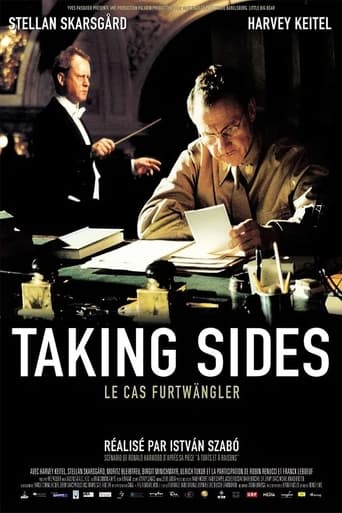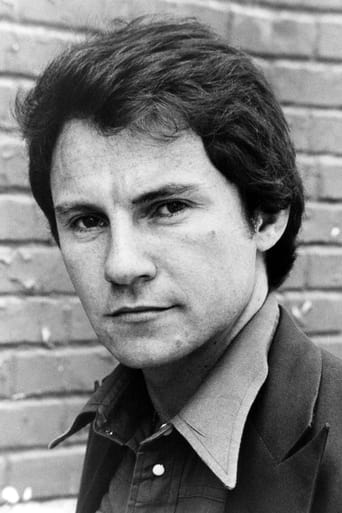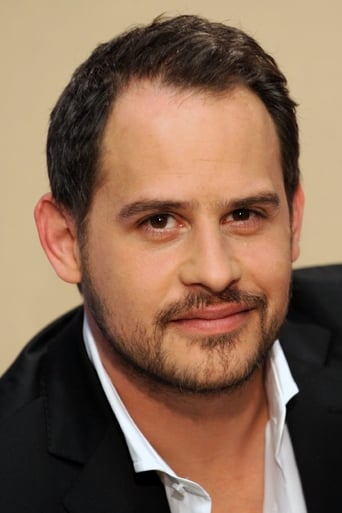Taking Sides (2002)
One of the most spectacular and renowned conductors of the 1930s, Wilhelm Furtwangler's reputation rivaled that of Toscanini's. After the war, he was investigated as part of the Allies' de-Nazification programme. In the bombed-out Berlin of the immediate post-war period, the Allies slowly bring law and order to bear on an occupied Germany. An American major is given the Furtwangler file, and is told to find everything he can and to prosecute the man ruthlessly. Tough and hard-nosed, Major Steve Arnold sets out to investigate a world of which he knows nothing.
Watch Trailer
Cast


Reviews
Fun premise, good actors, bad writing. This film seemed to have potential at the beginning but it quickly devolves into a trite action film. Ultimately it's very boring.
This story has more twists and turns than a second-rate soap opera.
The movie turns out to be a little better than the average. Starting from a romantic formula often seen in the cinema, it ends in the most predictable (and somewhat bland) way.
Actress is magnificent and exudes a hypnotic screen presence in this affecting drama.
An ignorant savage wrote "controversial conductor" about Wilhelm Furtwängler in the annotation to this page of the IMDb. Wilhelm Furtwängler had created not just an orchestra of a new vision of musicianship. Wilhelm Furtwängler had given to all people on Earth their identity of a civilized race. Nobody ever before or since had penetrated so deeply into the nature of music, the most sophisticated human creation. Nobody was able to enplane to us, humans what we are and what we can be so elegantly and clearly. But of cause we the listeners must make an honest effort to listen and try to understand. That is what the creators of the movie had done. I am thankful to them for their work that they had performed for me.There are two episodes in this movie that show us all in comparison to Wilhelm Furtwängler:1. A photograph showing Dr. Joseph Goebbels and Dr. Wilhelm Furtwängler talking to each other. A street bully, a thug Nazi and one of the most civilized and attractive humans who ever lived. 2. Wilhelm Furtwängler is trying to wipe his hand after a had shake with Goebbels while still bowing to the crowd of Nazis at their last concert in Berlin in April 1945.Both these Germans are the members of the same our human race. This film is a respectable effort to understand significance of Wilhelm Furtwängler.
Bombs can be heard in the distance as Beethoven's Fifth Symphony is being performed in a church in Berlin near the end of World War II. The conductor, Wilhelm Furtwangler, portrayed by Stellan Skarsgard, continues the performance despite the wailing of air raid sirens and a spotlight scanning the windows. It is only a power failure and a darkened hall that ends the concert. Back in his room, the conductor is warned by Hitler's architect, Albert Speer, that it might be better if he take a trip out of the country and "get some rest." This scene opens the film Taking Sides, a fictional account of the investigation by Allied officials at the end of the war to find and punish Nazi collaborators as part of its "De-Nazification" program. No musician could work professionally until they had been cleared by the Allies and Dr. Furtwangler, who had remained in Germany during the war, was no exception. Directed by Istvan Szabo and based on a play by Ronald Harwood who also wrote the screenplay, the pre-trial investigation focuses on the role of the artist in a totalitarian society, specifically, whether it is more effective to leave the country in protest or remain to work against the oppressive government from within.The film relies heavily on three interrogation session conducted in an office above a museum between an overbearing investigator, U.S. Major Steve Arnold (Harvey Keitel), and a proud but humbled Furtwangler, perhaps the greatest conductor of his time and the last, great exponent of the German Romantic school. Under orders from his superior, a U.S. general (R. Lee Ermey), to "nail the bandleader" and hold all Germans responsible for their war crimes, Arnold keeps Furtwangler waiting outside his office, contemptuously calls him "Wilhelm" and talks to him as if he was personally responsible for the gassing of millions of Jews.Arnold's aides, Lt David Wills (Moritz Bleibtreu), a repatriated German Jew, and Emmi Straube (Birgit Minichmayr), the daughter of an officer who was executed for his involvement in the plot to kill Hitler, support the investigation but eventually express their distaste for Arnold's methods and try to bring a sense of compassion to the proceedings. Though the film engages in spurious speculations such as whether or not Furtwangler's secretary procured women for his pleasure before each concert and whether damaging evidence lurks in a "Hinkel archive," the real thorn of contention is that the conductor remained in Germany during the war while other famous conductors such as Otto Klemperer, Arturo Toscanini, Fritz Busch, Bruno Walter, and Erich Kleiber left. Some were Jews who had no choice. Others left out of conscience.As the prosecution shows newsreel clips of victims of the holocaust being thrown into mass graves, Furtwangler, a deeply conflicted man, becomes more and more on the defensive. When he is brutally questioned by Arnold about the high posts he accepted in the government, the concert he gave to celebrate Hitler's birthday, and the fact that his recording of the Adagio from the Bruckner Seventh was broadcast to the nation after Hitler's suicide, Furtwangler says that no one who was not in his shoes could appreciate "the tightrope he walked between exile and the gallows." He asserts that he was only a pawn in the power struggle between Goebbels and Goring, and that his continued presence in Germany was desperately needed to keep the spirit of resistance alive and nourish the soul of the German people in the midst of barbarism.In support of their conductor, musicians from the Berlin Philharmonic testify that Furtwangler was a man of high ideals who disdained politics, refused to join the Nazi Party, give the Nazi salute, or conduct concerts in Nazi-occupied countries, and helped countless Jewish musicians in need of money, employment, or an exit visa out of Germany. Though strong points are made on both sides, Szabo stacks the deck in one direction by portraying the major as a bullying and cynical Philistine in contrast to the intelligent and highly articulate artist (not the case in real life). By the time of the final session, Arnold has descended into little more than a self-righteous bully.The film ends with a postscript. It is Berlin, 1942, a different world than any of us know. The conductor is the real Wilhelm Furtwangler, a tall, gaunt looking man with only a patch of hair on his balding head standing astride the podium, a baton in his hand. In the audience are Nazis Heinrich Himmler, the chief of the SS, and Joseph Goebbels, the Nazi propaganda minister. Conducting a performance of Beethoven's Ninth Symphony, a work of titanic spiritual struggle, Furtwangler does everything to guide the orchestra towards the realization of Beethoven's humanity. The musicians, however, as if possessed, unleash every ounce of the work's inner fury with reckless abandon.A long scream echoes through the hall, Alle Menschen werden Bruder, Wo dein sanfter Flugel weilt! (All the people will be brothers, dwelling under your gentle wing). In this setting, the words could not be more steeped in irony. It is an ode to joy but there is no joy, only a cry of pain reflecting the outrage, the hopelessness of the moment. It is the tormented expression of an orchestra and its conductor saying farewell to a country and a promise they can no longer believe in. Though Furtwangler was eventually exonerated, exhausted and overwhelmed by the weight of memory, unable to protect his reputation in spite of support from many Jewish artists such as Yehudi Menuhin, the greatness that rightfully belonged to him would forever remain elusive.
Taking Sides plays out in the last days, for a solid forty-five years, of Germany's existence as a unified country the aftermath of World War Two, and it centres in on a fierce tryst between an American who is a bully; aggressive and enjoys vaudeville and that of a relatively humble German composer whose life had been dedicated to classical music; appears humble but is suspected of being a Nazi. István Szabó's film is a wonderful, mostly dialogue driven piece, which in spite of rarely getting out of the office belonging to that of its central American character, takes us on a gritty adventure as the fate of one man's life hangs in the balance and the reputation of another's hangs additionally so.The film begins with a quite wonderful depiction of a full orchestra playing a classical piece to a silent crowd, but as we track and weave our way around the majesty of the location within which they play, it becomes apparent higher members of Germany's Second World War era Nazi party are in attendance and are enjoying as much as we are – the film's soundtrack dipping in pitch as the reveal arrives. The idea of Nazism lurking amidst what is, on the surface, elegant and quite beautiful goes hand in hand with what the film essentially goes on to depict; specifically, the conductor orchestrating said performance and the apparent ties he has with the German party of said time in spite of the fact surface characteristics are what they are. The war will later end, with an air raid ruining this particular performance, and a number of unseen historical events unfolding throughout the world, as we know, go on to bring about the downfall of the Third Reich thus paving way for the arrival of the Allies and their setting up of base camps all over the ruined nation.Enter Harvey Keitel's American Major, Steve Arnold; a man charged with investigating those whose role in Germany's European reign of Fascism were often enough to make a difference but were often too what they were in their nature to occupy the proverbial radar. Arnold was an insurance investigator before the war, so investigative procedure and worming out the truth the man's speciality with these assets predominant in his life up to now. Whilst on the blunt end of a superior's exposition, he watches footage over an old projector of The Final Solution in action, although does not flinch; his entry to what will be his office for the remainder of his time in Germany timed with that of the American flag going up and a group of German children running over offering goods and services as if in some sort of debt – the guard is changing as is whom the predominant force are. He works with Birgit Minichmayr's Emmi and Moritz Bleibtreu's former soldier, David Willis; two people brought in on a secretarial basis but whose own bond actually comes to form a substantial an often softer, refreshing pit-stop alternative to the predominant office set berating.The man he's asked to interrogate and suss out the true one-time identity of is a composer named Wilhelm Furtwängler, played by Stellan Skarsgård. Furtwängler, being a composer, you might say is used to driving performances of his own; keeping cool when the centre of attention and generally doing a good job in controlling what's around him. Here, he will come up against someone who has already torn apart and done his job with a handful of Furtwängler's orchestra, thus must now rely on more than the fact he has already been cleared of Nazism under another jurisdiction. The members of Furtwängler's orchestra speak highly of him when interviewed by Arnold, and in a film all about the perception of someone and an individual's true nature, we recall the dishevelled and somewhat sleepy look of the man during that opening when he conducted through the air raid and wonder if their claims are indeed as authentic as they seem.Above all else, Keitel does a superb job with his role; a man who has often played unlikeable people but whose tales we find ourselves drawn toward - here, he plays a bit of a bully and a bit of a boor, but is essentially a member of an Allied force attempting to wedge out those guilty of the things we, the audience, freely observed earlier on in the found footage session as those responsible for rather shocking manoeuvres are sought out to be brought to justice. Keitel's role is somewhat reminiscent to that of what he did in Jane Campion's Holy Smoke, from two years previously, in that he is a big; brash; booming; charismatic all-American who's called into town to cause someone specific to 'crack' into reverting to what they were prior to, what superiors deem to have been, selling their soul. He, like everyone involved in the production, deserve praise.
"Taking Sides" powerfully depicts difficult questions most thinking people have had: who is really responsible for genocide? Are all Germans responsible for Nazism? (All Rwandans ... Cambodians ... ? This list could continue forever until we are all in the prisoner's dock.) How is it that highly cultured people, who loved Beethoven, could commit inhuman crimes? Harvey Keitel plays an American officer in post-World-War-Two Germany who is given the job of dealing with Wilhelm Furtwangler, perhaps the best classical music conductor in the world. The question is, can Furtwangler be associated with the crimes of Nazism? Harvey Keitel and Stellan Skarsgaard give equally riveting performances, but Skarsgaard stands out because he depicts a type that films don't often focus on: a man so dedicated to his high art that he comes across as an extraterrestial when confronted with concrete concerns. His performance was certainly Oscar worthy.In a scene as heartwrenching as any I've seen in any film, Furtwangler attempts to present his carefully prepared philosophy of art. To say that he is rudely interrupted is an understatement. I cried for him, and for humanity.Keitel depicts a driven man who wants justice, but who arrived too late to exact it. Nazism's victims are already dead. He can't save them. And, so, he embarks on a Quixotic quest to bring down a man whose relationship to Nazism is questionable.Keitel's character wants desperately for the world to be painted in black and white, with heroes on one side and devils -- a word he uses -- on the other. At a key moment, his secretary, whose WW II family history is pertinent, makes a key disclosure that might have served to widen and deepen his view of the world. But this is a man who does not want a wider or deeper view of the world. He wants justice, something others might call revenge.Moritz Bleibtreu, Birgit Minichmayr and Ulrich Tukur are poignant, heart breaking, and thought provoking in smaller roles.Kudos to Ronald Harwood for his merciless script. Like characters on screen, I often wanted to take a break, to say, "This is just too much." The script falls like a hammer on very difficult issues.








